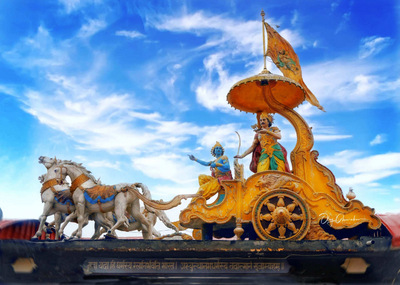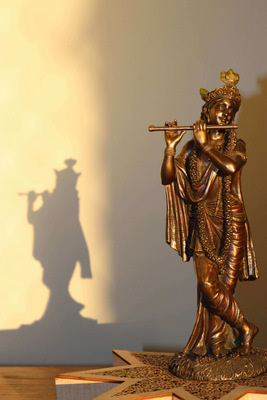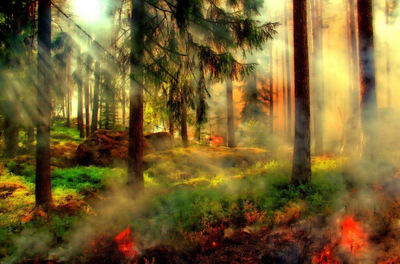
Summary: Mahabharata is a great epic in Hinduism detailing the story of the Kurukshetra war. However, it can also be seen as a collection of stories about Dharma, justice, politics, philosophy, valor, psychology, family, power, and much more. Here, we’ll read a few selected stories of Mahabharata in English.
Stories of the Mahabharata in English are one the best ways for modern people understand the Indian ethos. This epic is one of the two itihasas, or histories, in Hinduism. Timewise, it takes place at the end the Dwapara Yuga. Various gods took birth on the earth as humans to re-establish the natural law of justice and fight against evil. Narayana incarnated as Krishna to help the gods fulfill their responsibilities. Many of these events have been recorded as stories from the Mahabharata. We can find more short stories from the Mahabharata in the Puranas and Baghavatam. Along with reading these stories in English, We would like to suggest that you try and read a few stories from the Mahabharata in Hindi feel of the foundation of the ancient Indian ethos.
Let’s dive into a few short stories from Mahabharata in this post.
Stories of Mahabharata in English
We will focus on the not-so-popular or relatively lesser-known stories on this page. Our intention is to share as many stories of Mahabharata in English as possible to take the epic to more people from around the globe.
The Burning of Arjuna’s Chariot
The Kurukshetra war had come to an end with Dhuryodhana’s demise at Bheema’s hands. Most of the Kaurava side was eliminated by then. Krishna blew his Panchajanya as the Pandavas and Somakas joined. They moved away from the lake and went back to the battlefield to inform the remaining soldiers that the war had ended.
Arjuna and Krishna rode their chariot to Kurukshetra at the end. Once they reached the site, Krishna asked Arjuna to take his Gandiva bow and two quivers. He instructed Arjuna to jump down fast, and he said would follow soon.
Arjuna did as asked and walked a few feet away from the chariot. Once he was at a safe distance, Krishna followed suit. The moment he took a few steps backward, the chariot burned from top to bottom. First, the banner with Hanuman turned to dust. Then, the entire chariot, including the horses, was aflame. Arjuna was stunned. The others on the site were also shocked. They couldn’t believe their eyes.
Soon, all that remained was a pile of ash. Arjuna asked Krishna for the reason behind it. Krishna replied that the chariot wasn’t just a vehicle. It had absorbed all the energy and weapons aimed at Arjuna during the battle. In a way, the chariot was a shield that kept Arjuna alive to perform his Dharma. Krishna explained that it had even absorbed the Brahmastra and survived. This was solely due to Krishna’s presence on it. As a charioteer, he had been supporting the vehicle with his divine powers.
However, now, the war was over. Arjuna no longer needed a chariot to protect him. Hence, when Krishna let go of the reins and jumped down, he freed the chariot and allowed it to self-destruct to nullify the damage to others.
This is one of the stories of Mahabharata in English taken from Salya Parva.

Dhritarashtra Sees for the First Time
Dhritarashtra, Gandhari, and Kunti shifted to an ashram in a forest. Vidura and Sanjaya followed them. When Yudhistira went to take their blessings, Vidura gave up his life on a tree. His body stood intact on the tree as his life force entered Yudhistira. Vidura was none other than Dharma, and by moving into Yudhistira’s body, he wanted the new king of Histinapura to rule justly.
This meeting with the Pandavas made Dhritarashtra emotional. He thought about the lives lost during the Kurukshetra war. Vyasa then promised him that he would bring all the dead people back but for a short while.
The royal family went to the banks of River Ganga as instructed by Vyasa Mahamuni. Soon, the dead warriors walked out of the water. The first person to step out was Bhishma, dressed in battle gear, followed by Drona and Drupada. Abhimanyu, the Upapandavas, Gatotkacha, King Virata, Karna, Dhuryodhana, and everyone came out, looking just like they did when they were alive. However, they wore the celestial robes (except Bhishma) and were freed from their mortal shortcomings.
As a special boon, Vyasa also granted Dhritarashtra his eyesight to see his people for the first and last time. Dhritarashtra was elated to not just touch but actually see his sons, elders, and everyone dear to him.
The Pandavas, too, were equally delighted to meet their dead children. They took this as an opportunity to acknowledge Karna as their elder brother. Free of human emotions and hatred, Karna also embraced them as his family.
The evening turned to night as everyone made peace with the horrors of the war. The women who couldn’t see their husbands alive got a chance to say their last goodbyes. As the night deepened, the dead vanished and went back to their celestial destinations. The living found forgiveness to move on and lead happier lives.
This story is from Ashramavasika Parva.
Dhritarashtra’s Demise
This is one of the least-known stories of Mahabharata in English. Two years had passed with Yudhistira as the king of Hastinapura. Everyone had a routine, with the war left in their past. One day, Naradamuni visited the palace.
Yudhistira welcomed him and asked for information about Dhritarashtra, Gandhari, Kunti, and Sanjaya. He hoped they were doing well in the forest. Unfortunately, Naradamuni had no good news to share. He said that Dhritarashtra and the others traveled towards Gangadwara. For six months, Dhritarashtra performed severe penance to the point where he became a mere skeleton with skin draped on it.
Dhritarashtra was a strong man with powerful arms. Imagine the austerities he would have observed for his physique to change so drastically.
Naradamuni continued. He said that one day after completing his prayers in Ganga, Dhritarashtra saw the summer wildfire consuming the forest. Instead of panicking, he told Sanjaya to go to a safe place. The time had come for Dhritarashtra’s demise. He said Gandhari and Kunti would follow him. Sanjaya left with great reluctance and joined the sages on the riverbank.
However, Dhritarashtra was not concerned. He found peace in the approaching forest fire and sat down to mediate with both women on his side. A while later, the fire consumed their mortal bodies and freed them from this world.
Sanjaya then left the place and moved to a hermitage in Himavat to perform severe penance for as long as he lived. The Pandavas were saddened by this news. They couldn’t even say one last goodbye to their elders, especially their mother, Kunti.
This story is from Ashramavasika Parva.

Arjuna Learns the Truth from Vyasa
Thirty-six years had passed. The Pandavas received news of unrest and chaos at Dwaraka. Arjuna went to help only to realize that he couldn’t prevent the deaths or save the Vrishni people from robbers. His Gandiva bow ended up useless, and so did all his other weapons.
With great difficulty, Arjuna saved a few people and took them to Hastinapura. He made Kritavarma’s son the ruler of Marttikavat. Yuyudhana’s son was given a piece of land on River Sarawati’s banks to build a city. Krishna’s grandson, Vajra, was made the king of Indraprastha.
Rukmini and Jambavati sacrificed their lives while Satyabhama and others went into the forest to lead their remaining lives as ascetics. The events disturbed Arjuna, who had no idea what to do. He went to Vyasa Muni and asked him why he became a weak old man after being a powerful warrior for decades, and most importantly, why none of his celestial weapons worked.
Vyasa Muni explained that no one can interfere with ‘Time’. Krishna himself knew it was time for Dwaraka to sink. He gave up his avatar so that his presence wouldn’t change the natural course of action. Whatever had happened was destined to be. Vyasa told Arjuna not to mourn the loss as it could not have been prevented.
He then said that Arjuna was gifted the celestial weapons for a reason. There was a definite purpose of establishing Dharma on earth, and the weapons aided Arjuna in this. Now that it was fulfilled, the weapons were no longer bound to serve him. The time had arrived for his gifts to go back to heaven to their rightful owners.
Vyasa helped Arjuna realize that instead of grieving what was lost, he should be grateful for having them when it mattered. Arjuna thanked Vyasa and proceeded to Hastinapura to share the news with his family.
Soon afterward, the Pandavas made Pariksit the next ruler of the kingdom, with Yuyutsu as his guardian. The Pandavas and Draupadi renounced their royal life and began their journey through the Himalayas to reach heaven.
This story is from Mausala Parva.
Final Words
These stories of Mahabharata in English deal with the aftermath of the Kurukshetra war. They are sad but poignant and focus on coming to terms with the past. Be it Dhritarashtra or Arjuna, they learned more lessons through loss than through gains.
It does say something about life, doesn’t it?
Check out this page for 18 stories from the Mahabharata in english. You can find more stories : Stories
